MEDIA FOR CHANGE NETWORK
Monoculture tree plantations are a false climate solution
Published
5 years agoon
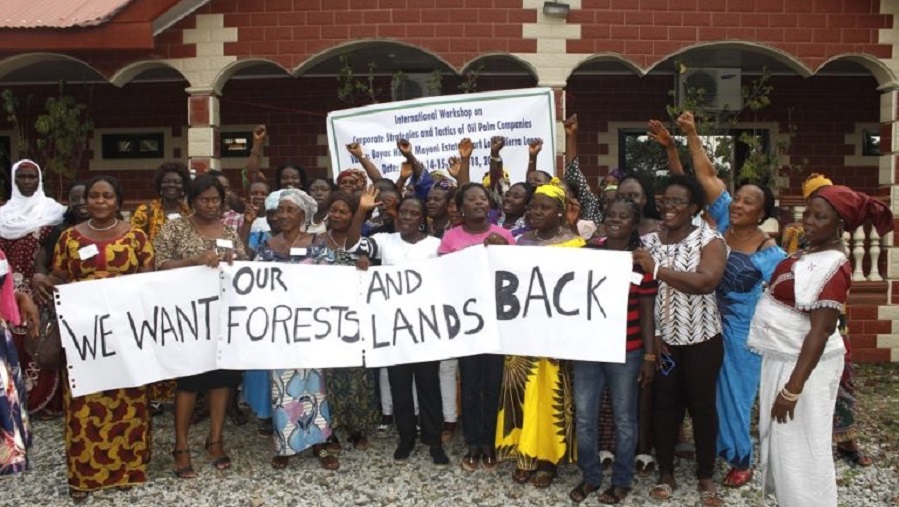
Yesterday was the 16th International Day of Struggle against Monoculture Tree Plantations. In 2004, rural communities in Brazil declared the day to commemorate the resistance against the expansion of monoculture tree plantations in Brazil. Through solidarity statements and actions around the world the day has evolved to become an International Day of Struggle.
This year, a group of organisations from African countries, together with the World Rainforest Movement, has issued an open letter about investments in monoculture tree plantations in the global South, particularly in Africa.
The letter is a response and critique of a June 2019 report titled, “Towards Large-Scale Commercial Investment in African Forestry”. The report was prepared by an outfit called Acacia Sustainable Business Advisors, which was set up by Martin Poulsen, a development banker. One of his co-authors for the study was Mads Asprem, the ex-CEO of Green Resources, a Norwegian industrial tree plantation and carbon offsets company. Green Resources’ land grabs in Mozambique, Tanzania, and Uganda have resulted in loss of land, evictions, loss of livelihoods and increased hunger for local communities.
The study was produced for the African Development Bank and WWF Kenya, with funding from the World Bank’s Climate Investment Funds.
The Open Letter (signed by 117 organisations and people) is posted here in full:
International Day of Struggle against Monoculture Tree Plantations
Open Letter about investments in monoculture tree plantations in the global South, especially in Africa, and in solidarity with communities resisting the occupation of their territories.
September 21st is the International Day of Struggle against Monoculture Tree Plantations. Unlike others, this Day was not created by the United Nations (UN) or by governments. The Day was created in 2004 by rural communities, gathered in the Brazilian hinterland, to denounce and shed light on the impacts of monoculture tree plantations on their territories, and affirm their determination to resist such plantations and take back their territories from the hands of corporations.
16 years later, the Day remains as relevant as ever: there is a real danger of a gigantic, worldwide expansion of monoculture tree plantation. This is promoted as a solution to prevent climate chaos and to the industrialized world’s dependence on oil, gas and coal. A group of governments, corporations, consultants, investors and major conservationist NGOs have come together to put their mega-plans[1] for tree plantation expansions on the table.
Although highly questioned, a forest as defined by the FAO (UN Food and Agriculture Organization) and several national governments mistakenly includes monoculture tree plantations. In their eyes, plantations are “planted forests”. This definition favours only the plantation corporations, thus guaranteeing their main objective: generating profits.
Africa is the continent with “the most profitable afforestation potential worldwide”, according to a report produced in 2019 by consultants for the African Development Bank (AfDB) and the conservationist NGO WWF-Kenya. “The study has identified around 500,000 ha of viable plantation land in ten countries: Angola, Republic of Congo, Ghana, Mozambique, Malawi, South Sudan, Tanzania, Uganda, Zambia and Zimbabwe.” The study proposes the speedy creation of a Fund, headquartered in a tax haven (Mauritius), to finance the planting of the first 100,000 hectares of trees.
In order for these plantations to generate profits for private investors, the study claims that aid will be necessary from European public international cooperation agencies, i.e., taxpayers’ money from Northern European countries, namely, Finland, Sweden, Norway, Denmark, Iceland, the United Kingdom and The Netherlands, as well as from the World Bank via the International Finance Corporation (IFC), which makes loans to private companies.
The study and its recommendations leave us perplexed and indignant, given the false assumptions and inconsistencies on which it is based (see Annex I for a more detailed description). Below, we present a summary of our main criticism.
The study repeats the same treacherous and false promises that corporations and their advocates always make. It states that plantations improve communities’ living conditions, create jobs, improve the soil and the quality and quantity of water. The corporations’ ‘social’ projects would be attractive to the communities. However, plantations lead to a large number of violations of rights, create very few poorly-paid and dangerous jobs, destroy forests and savannas, degrade soils, contaminate and dry up water sources and destroy communities’ way of life. With the plantations, guards arrive who will restrict communities’ freedom of movement; cases of abuse, sexual violence against women and HIV/AIDS infections increase in number. The promise of ‘social’ projects, often not fulfilled, is the main bargaining chip for corporations to gain access to communities’ lands.
The study refers to land conflicts only as “challenges” and the proposed solution is to “follow FSC and other best practises”. Firstly, the 500,000 hectares that the study suggests corporations should plant as monoculture tree plantations are not abandoned or degraded lands. Corporations always want fertile lands, usually flat and with availability of water – in other words, lands that tend to be used by communities. By recommending the FSC, the study ignores ample documentation that proves that the FSC does not solve plantations’ structural problems, and land conflicts even less. The FSC deceives consumers by considering the model of large-scale monoculture plantations “sustainable”, for it always leads to large tracts of land being controlled by corporations and to the intensive use of agro-chemicals and synthetic fertilizers. So far, compensation for the populations that have lost their lands and means of subsistence has always been derisory or inexistent. Meanwhile, the social, environmental, economic and cultural damage caused by monoculture tree plantations in rural areas of African countries has never been compensated by corporations. There exists no way to calculate the damage and much of the harm done is irreparable.
The study references a World Bank/IFC project in Mozambique, stressing that “one important element of the IFC approach will be to define and register land rights”. In fact, the World Bank, as well as financing plantations, has a policy of encouraging governments in countries of the South to speed up the granting of individual deeds and, therefore, the privatization of land, in an attempt to prevent its collective recognition as community land. The World Bank has been promoting the handing over of community lands to private capital all over the world. It is important to highlight the fact that in recent years, the government of Mozambique has put in place a number of reforms in the forestry sector. These include a review of the Forestry Policy and its Implementation Strategy and, very recently, a public consultation process with a view to also reviewing the National Land Policy. In all of these processes the World Bank is the common denominator in terms of promotion and financial “support”. This review is taking place under the pretext of improving transparency and efficacy in land management and policies, and will inevitably force an alteration of the Land Law and respective Regulation, thus legitimizing the occupation of community lands which provide living conditions for communities and peoples.
The study states that the tree plantations would be “a stable, long-term carbon sink”, and result in “substantial adaptation benefits” vis-à-vis climate change at the local level. By stating this, the study ignores a growing body of scientific work showing that monoculture tree plantations are a false climate solution. The experiences of communities all over the world with monoculture tree plantations show that they create a local environment even less prepared for responding to the ever more perceptible impacts of climate change.
The study states that “Global oil and industrial companies” want to “become part of the solution rather than a major part of the problem. They are beginning to see the potential of forestry investments.” Oil and gas companies are an integral part of the climate crisis, regardless of such proclamations. They have not shown any interest in solving it; on the contrary, they intend to invest first and foremost in false solutions – after all, profits are above all else.
Other false statements include: “the world will need the type of intensive afforestation (…) that the Brazilian forestry industry is implementing”; and that Brazil’s neighbour, Uruguay, is “the world’s most recently developed forestry country”. The truth is that the Brazilian experience with industrial tree plantations over the course of the last few decades has led to numerous land conflicts and environmental degradation. Municipalities with the highest concentrations of plantations are among the poorest, compared with those with diversified agriculture based on smallholders. In Uruguay, the same negative impacts occur. Rural areas have seen a massive exodus of people, with the rural population reduced by half. Furthermore, citizens of Uruguay have taken on an enormous debt, owing to a recent contract between its government and Finnish multinational UPM. According to this contract, the government agreed to carry out multi-million dollar infrastructure works to service UPM and the export plans of its second pulp factory.
The study also states that “The main barrier to successful investments in African greenfield planting is low historic returns. New planting by private companies has ground to a halt in recent years.” This not only reveals that profits are what really matters to private investors, but also that the authors of the study deliberately ignore the main reason why the expansion of industrial plantations has been impeded in various African countries: the resistance of communities against such monoculture plantations.
The study also seeks to attract investors, suggesting “the possibility of planting [trees] at significantly lower costs (…), more or less half of 10 years ago (…)”. Promising companies that they will have to spend less means that the weight of the industrial plantation projects from the proposed fund will fall even more upon already indebted African countries and, consequently, on their populations, particularly rural communities that run the risk of losing their most fertile lands.
It is important to stress that a “conservationist” NGO is a co-producer of this study that promotes investments that will benefit first and foremost private companies. The study itself reveals how NGOs like WWF should no longer be considered NGOs since they function and act as the ‘right hand of the plantation industry’.
The report refers to a non-public version of the study which has not been disclosed to the public as far as we are aware. The report also notes that “(…) there is a clear coalition of DFIs [development finance institutions] interested in further discussion on this topic [creation of the Fund], including: CDC [United Kingdom], Finnfund [Finland], IFC [World Bank], NDF [Nordic countries: Finland, Norway, Sweden, Denmark, Iceland] and FMO [The Netherlands]”. This demonstrates that decisions about investments are being made without the participation of the communities and other civil society organizations and social movements from the regions in question, i.e., the parties most affected. How can it still be acceptable in the 21st century that public international cooperation agencies use money from their taxpayers in this way? Hiding their decisions from their own citizens and from the populations that will be affected? When plantation corporations and their investors, after everything has been decided, state that they are applying the principle of communities’ “free, prior and informed consent”, does this merit any credibility?
We demand that the non-public version of this study be published immediately by the AfdB and WWF-Kenya, so that its content may be known to the communities and organized civil society in the countries where they intend to implement their plans.
We reiterate our indignation with regard to the channelling of public resources towards private investments, through tax havens, to be invested in highly damaging activities, such as large-scale monoculture plantations.
We further demand a wide-ranging review of the process of allocation of land to plantation corporations, ensuring the return of land to the communities that depend on this land, today and in the future. In Mozambique, for example, peasant agriculture constitutes the main guarantee of subsistence for more than 80% of the population, and the land is the only thing to which communities can resort to ensure food safety and sovereignty.
We reiterate our solidarity on this September 21st with the legitimate and just struggles of communities around the world that resist the advance of plantations and strive to take back their lost lands. They must be remembered and made visible every day. And they will certainly resist this new and insane expansion plan proposed in the AfDB and WWF-Kenya study and commented on in this Open Letter.
We appeal to the solidarity and unity, so that together we may demand the immediate abandonment of any and every afforestation programme based on large-scale monoculture plantation.
The Struggle Continues!
Plantations Are Not Forests!
Signed by:
- ADECRU (Mozambique)
- Justiça Ambiental (Mozambique)
- Missão Tabita (Mozambique)
- SUHODE Foundation (Tanzania)
- WRM (International)
Related posts:
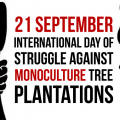
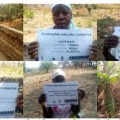 The African Development Bank and the Tree Plantations Industry
The African Development Bank and the Tree Plantations Industry
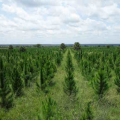 MONOCULTURE TREE PLANTATIONS – Uganda – Promotion of plantation agriculture – a disgrace to human kind and environment
MONOCULTURE TREE PLANTATIONS – Uganda – Promotion of plantation agriculture – a disgrace to human kind and environment
 12 Replies to 12 Lies about Industrial Tree Plantations: New edition of a WRM briefing paper
12 Replies to 12 Lies about Industrial Tree Plantations: New edition of a WRM briefing paper
 Colonization and Monoculture Plantations: Histories of Large-Scale ‘Grabbings’
Colonization and Monoculture Plantations: Histories of Large-Scale ‘Grabbings’
You may like
MEDIA FOR CHANGE NETWORK
Seed Sovereignty: Most existing and emerging laws and policies on seeds are endangering seed saving and conservation on the African continent.
Published
2 days agoon
November 11, 2025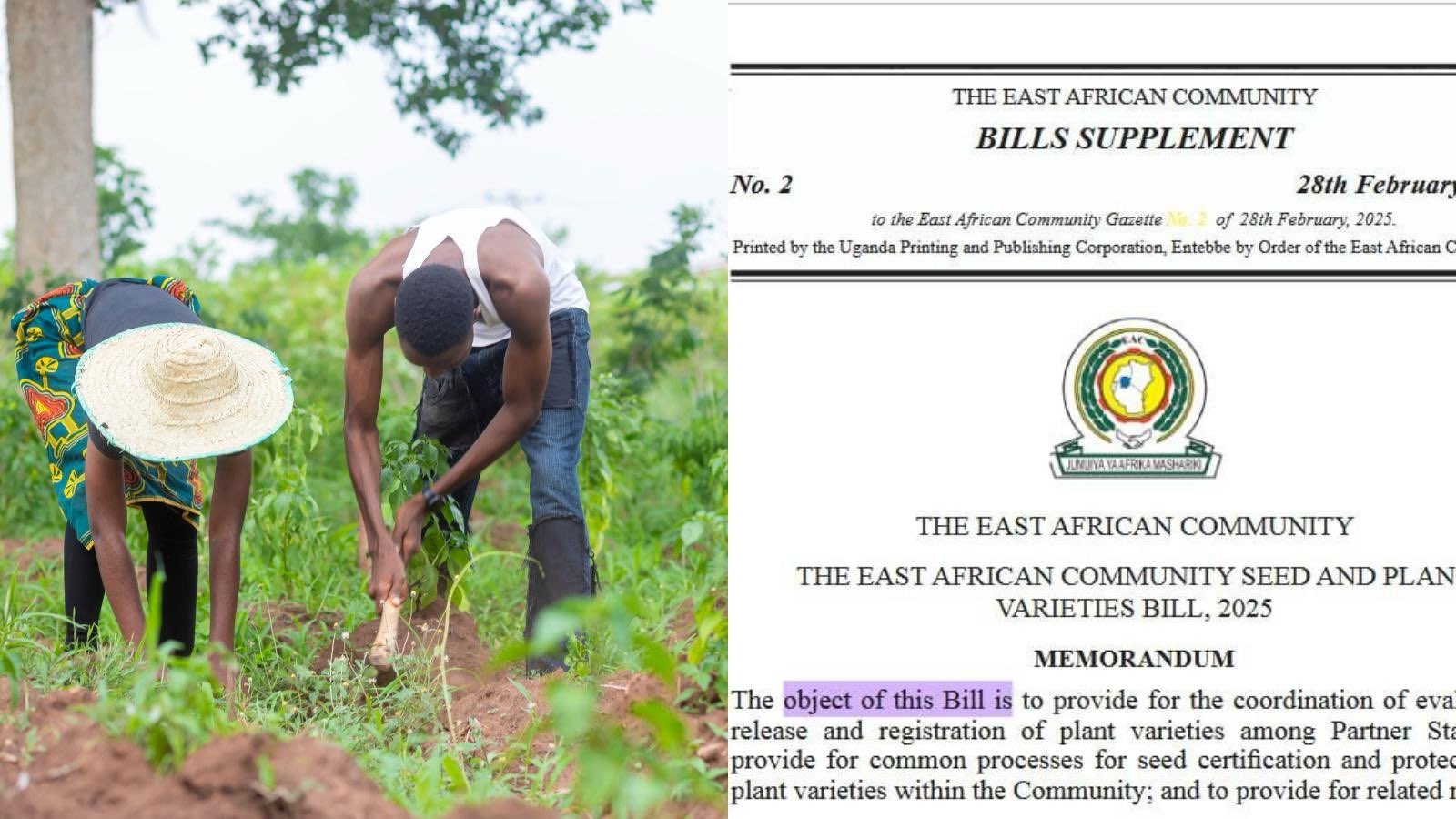
By the Witness Radio team
In Africa, farmers and civil society organizations are urgently warning about the adverse effects of existing policies on agrobiodiversity. These policies aim to erode centuries-old traditions of seed saving and exchange, effectively undermining seed sovereignty and intensifying dependency on commercial seed companies.
The struggle over seed sovereignty, particularly the rights of smallholder farmers, has become one of the most pressing issues for the continent’s agricultural future. As governments introduce new seed laws, such as the proposed East African Seed and Plant Varieties Act Bill of 2024, the preservation of cultural seeds and the rights of smallholder farmers are at stake.
The Communications and Advocacy Officer at Kenya’s Seed Savers Network, Tabitha Munyeri, notes that this has heightened monoculture, thereby significantly reducing the focus on indigenous plant varieties.
“There’s a lot of loss of agrobiodiversity with people focussing on a few foods, a few crops, leaving out so many other essential crops that have sustained humankind for generations and it is also important because it is coming at a time where we are having a lot of also conversations around different seed laws that are coming up for example within the EAC we see that there is the seed and plant varieties bill of 2024 and we are looking at it as a huge setback and there is need for us to create awareness around even the policies that exist.”
She further argues that there is a need to raise awareness and sensitise farmers to the existing policies so that they can understand their effects on agrobiodiversity.
“Even for Kenya we have been having punitive seed laws for the longest time but now we are happy that courts of law are reviewing the law, but we still think that there is need to create a lot of advocacy around the seed laws and what they really mean to farmers because some of them do not understand, some of them are not even interested but once they get to know what it means and the impacts that the laws have on them then they are also able to become more vocal and more involved in the process.” She says.
Farmers in Africa have been the custodians of agricultural biodiversity, developing and maintaining numerous varieties of crops that are suited to local soils and climates. However, over the last few decades, the focus on farming has drastically declined to a handful of “high-yield” crops and imported hybrid varieties, leaving out the diverse indigenous seeds that have sustained communities through droughts, pests, and diseases.
Munyeri warns that this decline in agrobiodiversity is accelerating, driven not merely by market pressures, but by restrictive laws that criminalise and discourage traditional seed-saving practices.
In Kenya, where smallholder farmers supply more than 80 percent of the country’s food, seed systems have long depended on the informal exchange of seeds within communities. Small-hold farmers have relied on these systems to share, adapt, and innovate with seeds suited to their local conditions. However, existing laws have tended to favour the formal sector, requiring seed certification, variety registration, and compliance with intellectual property protections that most small-scale farmers cannot afford.
The 2024 Seed and Plant Varieties Act Bill, currently under discussion in several East African countries, has sparked significant controversy. It seeks to modernize agriculture and align national systems with international standards. However, smallholder farmers and critics contend that it allows corporate control over genetic resources, limiting farmers’ autonomy and threatening biodiversity. Under such a framework, only registered seed varieties can be legally traded or exchanged, effectively outlawing the informal seed networks that have sustained rural communities for centuries.
If smallholder farmers lose their rights to exchange and cultivate indigenous varieties, they may also lose control over their food systems. Dependence on improved seeds necessitates purchasing new stock each planting season, eroding self-reliance and increasing vulnerability to market fluctuations.
This awareness gap is what the Seed Savers Network hopes to address. Through training programs and advocacy initiatives, including its recently concluded regional boot camp, the organization equips participants from across Africa with knowledge about seed laws, biodiversity, and policy engagement.
Related posts:

 Seed Boot Camp: A struggle to conserve local and indigenous seeds from extinction.
Seed Boot Camp: A struggle to conserve local and indigenous seeds from extinction.
 The EAC Seed & Plant Varieties Bill, 2025, is a potential threat to smallholder farmers, as it aims to disengage them from the agriculture business, according to experts.
The EAC Seed & Plant Varieties Bill, 2025, is a potential threat to smallholder farmers, as it aims to disengage them from the agriculture business, according to experts.
 CSOs and Smallholder farmers are urgently convening to scrutinize the EAC Seed & Plant Varieties Bill, 2025.
CSOs and Smallholder farmers are urgently convening to scrutinize the EAC Seed & Plant Varieties Bill, 2025.
 African governments are giving in to corporate pressure and undermining local seed systems – report
African governments are giving in to corporate pressure and undermining local seed systems – report
MEDIA FOR CHANGE NETWORK
Lands ministry rejects call to save over 300 Masaka residents facing eviction
Published
1 week agoon
November 5, 2025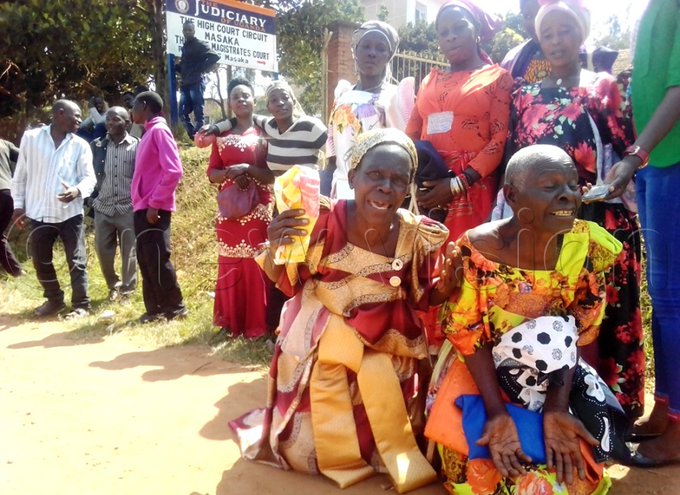
Over 300 families now face displacement, with the landlords’ legal team, Solis Advocates, having served eviction notices in 2021. (Credit: Dismus Buregyeya)
Lands state minister Joseph Mayanja and Minister Judith Nabakoba ruled out further administrative intervention, citing a 2019 court ruling that declared the residents had encroached on land owned by Masaka Jaggery Mills Ltd.
Lands state minister Joseph Mayanja and Minister Judith Nabakoba ruled out further administrative intervention, citing a 2019 court ruling that declared the residents had encroached on land owned by Masaka Jaggery Mills Ltd.The conflict stems from a 2019 ruling by Masaka chief magistrate Deo Ssejjemba, which sided with landlords Joseph Matovu and Methodius Kasujja in their eviction bid against the locals.
The court’s decision, upheld after residents withdrew an appeal in 2021, set the stage for the current standoff.
Despite this, the affected families, many of whom lost homes, crops, and plantations, petitioned the President in 2021, prompting former Vice-President Edward Ssekandi and the State House legal teams to intervene.
However, Mayanja emphasised that all avenues for mediation had been exhausted.
“The matter has been conclusively resolved through legal and administrative processes. No further interventions are justified,” he stated in a letter dated October 28, 2025, rejecting a last-minute plea for a site visit.
Unresolved
Nabakoba confirmed that 105 families received compensation between shillings 300,000 and 12 million from the landlords in 2021 after signing agreements.
However, a ministry report revealed 215 families remain uncompensated, pending verification of their claims.
“We closed the mediation process when the majority accepted the settlement,” Nabakoba said. However, locals like Vincent Mugerwa, leader of the Kasanje Bibanja Owners Association, denounced the payouts as “peanuts,” citing offers as low as shillings 800,000 per acre.
The dispute has drawn high-level attention, including from legislator Joanita Namutawe, who petitioned Parliament, and Prime Minister Robina Nabanja, who met with security officials in Masaka last week. Despite these efforts, the lands ministry insists the case is closed.
Residents, however, contest the land’s ownership history, alleging irregularities in transfers from the original owners, the Masaka Jaggery Mills, to current landlords. Title documents show the land was registered under Freehold Volume 59 Folio 11, transferred to Joseph Bukenya in 2021, before passing to Methodius Kasujja.
Facing eviction
Over 300 families now face displacement, with the landlords’ legal team, Solis Advocates, having served eviction notices in 2021.
The Prime Minister’s office received a fresh petition on October 31, detailing the residents’ grievances, including destroyed property and inadequate compensation.
Original Source: New Vision
Related posts:

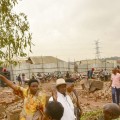 Outcry as Court Orders Eviction of 500 Families in Masaka
Outcry as Court Orders Eviction of 500 Families in Masaka
 Electricity Transmission Company holds titles in Masaka as residents point to foul play
Electricity Transmission Company holds titles in Masaka as residents point to foul play
 Residents in Nakaseke district woke up to eviction notice amid COVID-19 lock-down land eviction directives.
Residents in Nakaseke district woke up to eviction notice amid COVID-19 lock-down land eviction directives.
 Uganda’s top Lands Ministry official has been arrested and charged with Corruption and Abuse of Office, a significant event that will have far-reaching implications for land governance in the country.
Uganda’s top Lands Ministry official has been arrested and charged with Corruption and Abuse of Office, a significant event that will have far-reaching implications for land governance in the country.
MEDIA FOR CHANGE NETWORK
Report reveals ongoing Human Rights Abuses and environmental destruction by the Chinese oil company CNOOC
Published
1 week agoon
November 3, 2025
By Witness Radio team.
Three years into the Kingfisher oil and gas extraction project, the situation in Kikuube District is dire. Despite repeated warnings and criticism from human rights and environmental organizations, the impact on the local population remains intolerable.
In 2024, the Environment Governance Institute Uganda (EGI) and Climate Rights International (CRI) independently published reports on the Kingfisher oil production project. A year later, in September 2025, these two influential organizations united their efforts to produce a follow-up report, which revealed even more alarming results.
The report titled “Extortion, Coercion, and Impoverishment. Human Rights Abuses and Governance Failures in the China National Offshore Oil Corporation’s (CNOOC) Kingfisher Oil and Gas Project” paints a grim picture. It shows that the hardships and abuses faced by residents of the China National Offshore Oil Corporation (CNOOC) Uganda Ltd. are not isolated incidents, but an ongoing series of violations.
Alongside the larger Tilenga project and the East African Crude Oil Pipeline (EACOP), the Kingfisher project is a crucial component of the extensive fossil fuel extraction operation in Uganda, which has been ongoing since 2017. The most important players involved are the French company TotalEnergies, the Tanzania Petroleum Development Corporation (TPDC), the Uganda National Oil Company (UNOC), and the Chinese energy giant CNOOC. While a subsidiary of TotalEnergies is implementing the Tilenga project, CNOOC serves as the executing partner for the Kingfisher project.
Last year’s reports demonstrated the immense environmental damage caused by the Kingfisher project. The Climate Accountability Institute predicted that the entire Ugandan oil production project would increase the country’s emissions. All of the projects will contribute significantly to global warming and, like all new fossil fuel extraction projects, are incompatible with the Paris Agreement’s 1.5 °C warming target.
In Kikuube district, oil drilling activities along the Lake Albert shoreline have allegedly resulted in the demolition of vegetation, increased sediment runoff, and chemical leaks over the last year, leading to the loss of breeding grounds for the local fish population, which is the basis of the livelihood for most local communities. Moreover, visible water pollution is an increasing threat to public health, as the lake is the only available water source for many residents.
Most households in villages bordering the project lack the funds to afford clean water or even medication, as they are experiencing a severe loss of income. Access to the area surrounding the project, including Nsonga, Nsuzu A, Nsuzu B, Kiina, and other nearby villages, is tightly controlled by security forces, like the Counter-Terrorism Police, the regular Traffic Police, and joint UPDF and Saracen Private Security company patrols. These enforce unannounced daily curfews by threatening and beating villagers encountered out of their homes after 6 or 7 pm, which results in a decrease in earnings for street vendors, whose main trading hours are often in the evening.
Fishing and fish trading – the primary sources of employment in the area – are also suffering greatly from the situation controlled by the company. Every two weeks, fishermen are required to pay 200,000 UGX in fishing fees. Fish traders – most of whom are women or youth – also must pay fees for their goods when passing through security checkpoints, which they often cannot afford. None of these fees levied by the security forces are receipted or even explained.
In addition to the physical restrictions, there is the ongoing loss of land. The company continues to take over communal land in the communities, forcibly evicting former residents without compensation.
Violent attacks for non-compliance with the new rules and fees are not uncommon and violate international human rights laws. In addition, there has been a disturbing increase in sexual and gender-based exploitation and abuse towards particularly vulnerable women. Many lose their sources of income due to the changed conditions and are forced into prostitution. The result is an increase in teenage pregnancies and school dropouts.
While the entire oil production project has been repeatedly criticized for human rights violations and illegal evictions, CNOOC’s actions are particularly egregious. Unlike other comparable projects, the company has never published a Resettlement Action Plan (RAP) setting out compensation requirements and plans for restoring livelihoods. However, this is a necessary measure according to Ugandan and international standards. Although CNOOC has officially committed to developing an accessible grievance mechanism for community members, the residents interviewed for the report are not aware of any such mechanism.
Although arbitrary violence and sexual assaults against women have decreased since a new commanding officer of the local Uganda Peoples’ Defense Forces (UPDF) was appointed, restrictive military control over the area and its inhabitants remains oppressive. Even under the new commander, Mubingwa Moses, residents continue to be restricted in their traditional way of life and work by opaque rules. The systematically imposed fees further exacerbate the situation of those affected and can only be described as exploitation.
The report by EGI and CRI makes a fundamental demand: “Uganda’s oil development is perpetuating climate, environmental, and human rights harms in violation of both national and international law and should be discontinued”. Furthermore, it explains in detail what is specifically needed to change the situation for those affected. The demands include conducting an independent and transparent investigation into the documented human rights violations, environmental degradation, and socio-economic impacts.
An independent body should examine all activities and suspend them until the situation is resolved. The primary demand is to ensure reparations and corporate accountability. CNOOC is expected to adopt a strict zero-tolerance policy regarding human rights violations, violence, and corruption, and to provide accessible and effective grievance procedures and compensation for those affected. In this regard, an appeal is made in particular to state and international institutions to monitor and enforce the promises made by the company.
Related posts:

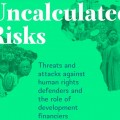 Development financiers fuel human rights abuses – New Report
Development financiers fuel human rights abuses – New Report
 StopEACOP Coalition warns TotalEnergies and CNOOC investors of escalating ‘financial and reputational’ Risks
StopEACOP Coalition warns TotalEnergies and CNOOC investors of escalating ‘financial and reputational’ Risks
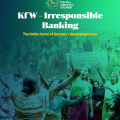 A German Bank is under intense scrutiny for its irresponsible banking practices, which have been directly linked to displacement and human rights abuses.
A German Bank is under intense scrutiny for its irresponsible banking practices, which have been directly linked to displacement and human rights abuses.
 The 4th African Forum on Business and Human Rights: The rapidly escalating investment in Africa is urgently eroding environmental conservation and disregarding the dignity, the land, and human rights of the African people.
The 4th African Forum on Business and Human Rights: The rapidly escalating investment in Africa is urgently eroding environmental conservation and disregarding the dignity, the land, and human rights of the African people.

Climate wash: The World Bank’s Fresh Offensive on Land Rights

Africa’s Land Is Not Empty: New Report Debunks the Myth of “Unused Land” and Calls for a Just Future for the Continent’s Farmland

Discover How Foreign Interests and Resource Extraction Continue to Drive Congo’s Crisis

Seed Sovereignty: Most existing and emerging laws and policies on seeds are endangering seed saving and conservation on the African continent.

StopEACOP Coalition warns TotalEnergies and CNOOC investors of escalating ‘financial and reputational’ Risks

Oil palm tree growing in Uganda: The National Oil Palm Project is threatening to evict hundreds of smallholder farmers to expand its operations.

New! The Eyes on a Just Energy Transition in Africa Program is now live on Witness Radio.

Know Your Land rights and environmental protection laws: a case of a refreshed radio program transferring legal knowledge to local and indigenous communities to protect their land and the environment at Witness Radio.

Innovative Finance from Canada projects positive impact on local communities.
Over 5000 Indigenous Communities evicted in Kiryandongo District
Petition To Land Inquiry Commission Over Human Rights In Kiryandongo District
Invisible victims of Uganda Land Grabs
Resource Center
- REPARATORY AND CLIMATE JUSTICE MUST BE AT THE CORE OF COP30, SAY GLOBAL LEADERS AND MOVEMENTS
- LAND GRABS AT GUNPOINT REPORT IN KIRYANDONGO DISTRICT
- THOSE OIL LIARS! THEY DESTROYED MY BUSINESS!
- RESEARCH BRIEF -TOURISM POTENTIAL OF GREATER MASAKA -MARCH 2025
- The Mouila Declaration of the Informal Alliance against the Expansion of Industrial Monocultures
- FORCED LAND EVICTIONS IN UGANDA TRENDS RIGHTS OF DEFENDERS IMPACT AND CALL FOR ACTION
- 12 KEY DEMANDS FROM CSOS TO WORLD LEADERS AT THE OPENING OF COP16 IN SAUDI ARABIA
- PRESENDIANTIAL DIRECTIVE BANNING ALL LAND EVICTIONS IN UGANDA
Legal Framework
READ BY CATEGORY
Newsletter
Trending
-
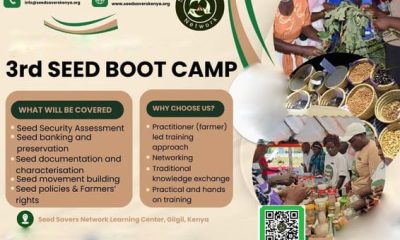
 MEDIA FOR CHANGE NETWORK2 weeks ago
MEDIA FOR CHANGE NETWORK2 weeks agoSeed Boot Camp: A struggle to conserve local and indigenous seeds from extinction.
-

 MEDIA FOR CHANGE NETWORK1 week ago
MEDIA FOR CHANGE NETWORK1 week agoReport reveals ongoing Human Rights Abuses and environmental destruction by the Chinese oil company CNOOC
-

 SPECIAL REPORTS AND PROJECTS1 week ago
SPECIAL REPORTS AND PROJECTS1 week agoThe Environmental Crisis Is a Capitalist Crisis
-

 MEDIA FOR CHANGE NETWORK1 week ago
MEDIA FOR CHANGE NETWORK1 week agoLands ministry rejects call to save over 300 Masaka residents facing eviction
-

 SPECIAL REPORTS AND PROJECTS1 week ago
SPECIAL REPORTS AND PROJECTS1 week agoGlobal use of coal hit record high in 2024
-

 MEDIA FOR CHANGE NETWORK2 days ago
MEDIA FOR CHANGE NETWORK2 days agoSeed Sovereignty: Most existing and emerging laws and policies on seeds are endangering seed saving and conservation on the African continent.
-

 NGO WORK1 day ago
NGO WORK1 day agoDiscover How Foreign Interests and Resource Extraction Continue to Drive Congo’s Crisis
-
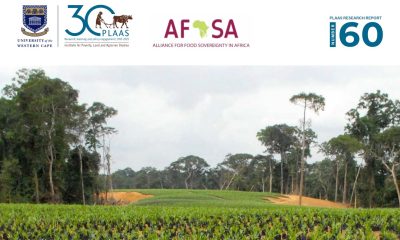
 NGO WORK9 minutes ago
NGO WORK9 minutes agoAfrica’s Land Is Not Empty: New Report Debunks the Myth of “Unused Land” and Calls for a Just Future for the Continent’s Farmland
